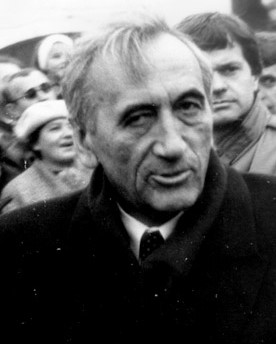Socialist Party (Seketan)
This article is incomplete because it is pending further input from participants, or it is a work-in-progress by one author. Please comment on this article's talk page to share your input, comments and questions. Note: To contribute to this article, you may need to seek help from the author(s) of this page. |
Socialist Party Sošyça ynden | |
|---|---|
 | |
| Abbreviation | SY |
| Leader | Eris Kellisyen |
| President | Gofred Deissner |
| Founded | October 13, 1969 |
| Legalised | February 1, 1977 |
| Youth wing | Socialist Youth Association |
| Ideology | Social Democracy Factions: |
| Political position | Centre-Left |
| Wilsk addiliation | Democratic Labour Party |
| Colors | Green |
| Commons Council | 167 / 293
|
| State Council | 53 / 106
|
| State Governors | 4 / 7
|
| State Legislatures | 181 / 487
|
The Socialist Party is a social democratic political party in Seketan. The party was founded in 1968 as a protest organizing group called the Socialist Party during the 1978 Seketese Revolution but was made illegal in 1969. It was legalized in 1978 and formed the first democratic government. Today the party sits on the centre-left of the Seketese political spectrum and supports isolationism and soft euroscepticism. The party's current leader is Prime Minister Eric Kellisyen since 2017.
For as long as Seketan has existed as an independent republic the socialist movement, promoting workers rights, equality and social programs, has been alive with many parties vying for the lions share of the voters. In early elections, the Labour Party proved to be the most successful, with a large tent over the whole left wing spectrum, especially under the authoritarian Kjedorate regime. However come the 1978 Seketese Revolution and the democratization of Seketese politics, many on the left broke away from the old Labour Party and re established the organization as political party to contest elections under a more moderate and pro-democracy platform.
The party has governed Seketan for most of the late- 20th and early 21st century, only being out of government in the 1992, 2002 and 2017. Its notable accomplishments are setting up Seketans Health Seketan, liberalizing social policies such as LGBT+ rights in Seketan, Seketan’s admission into the EEC and being key to the democratization of Seketan.
History
Establishment
During the 1960's Seketan experienced changes in its economic and social landscape. In the provinces of Wilskland and Fjeska ethnic conflict arose, with Fjeska seeing the worst and most violent fighting which sparked on by the 1960’s counterculture movement sparked protests. Later workers unions would conduct wildcat strikes as economic conditions worsened during a recession. Under these conditions several groups of left-wing protesters came together and formed the Socialist Democracy Movement in 1968 to better coordinate their civil disobedience.
Underground organization
The movement would help fund and organize protests for just under a year until they were banned by the Kjedorate Party in 1969 for “subversive and insurgent practices”. Despite this the group continued to meet in secret. The group was led by Patjik Moulette, a local school teacher who led a strike in 1963. During this time the organizations worked with other left wing and pro-democratic movements such as the Workers Liberty Association, the Democratic Seketan Movement and the Student Democratic Union to plan and execute small scale protests against the Kjedorate regime.
The movement was one of the major groups to launch the wave of strikes and protests that resulted in the 1978 Seketese Revolution, most famously the 1978 Conelibek general strike. Upon the success of the revolution Moulette and several other leaders were invited to the Constitutional Convention to help form the Fourth Seketese Republic
Legalization
After the adoption of the Forth Republic's Constitution Seketan's first democratic elections were held in 1978 Seketese Election. The party won the most seats and formed government with the Democrats and Liberals with Moulette as Seketan's first democratically elected Prime Minister. During his time as Prime Minister, Moulette would nationalize Seketan's oil industry under SekOil and would reform healthcare into the modern universal system it is today. He would continue to serve under various coalition and majority governments until 1994 when he retired from politics. After Moulette, the party would go through several interim leaders until 1995 when Jorgi Wethan took over leadership.
Under Wethan's leadership the party would lose the 1996 Seketese Election to the National Conservative's and their leader Jajmes Marksonn, becoming the Chief Opposition for the first time in their history. The loss was attributed to the chaotic leadership shuffles after Moulette's departer and a struggling economy during the Early 1990's recession. Wethan would resign as party leader on election night, prompting a leadership election that would pick former Defense Minister Simeon Trejiak to lead the party in opposition.
Today
Trejiak would lead the party into the 1996 Seketese Election over the one term Marksonn government. Due to a change in electoral system implemented by the National Conservatives, Trejiak had won only a minority of seats and had to form a coalition with newly formed Liberal Democrats, creating a centrist government. Under Trejiaks first government several public utilities would be sold off, such as Aviation Seketan and the Seketese Liquor Corporation, as per the coalition agreement with the Liberal Democrats. After being reelected in 2000 with a stronger minority government, the party was able to form a confidence and supply agreement with the young Green Party. The second Trejiak administration would see Seketan join the Kyoto Protocol, end border and ethnic disputes with Trjebia and the eventual legalization of same-sex marrige in Seketan in 2008.
Today the party is led by Eris Kellisyen, who has been Prime Minister ever since the 2017 election, defeating the National Conservstive government in power. He has formed three governments, first with the Liberal Democrats in 2017, second with the Greens in 2018, and currently leads a majority government. Since coming to office he has pushed for currency reforms after high inflation during The Great Recession, privatized much of Seketan’s public post secondary education system and publicly apologized on behalf of Seketan for the massacres during the Fjeskan Crisis.
Leadership
| Role | Leader | Portrait | Term | Seat |
|---|---|---|---|---|
| Leader | Eris Kellisyen | May 14, 2014-Present | Conelibek-University | |
| Assistant Leader | Pol Cathan Caron | December 22, 2016-Present | Bynan List |

